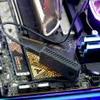Introduction
Sabrent Rocket nano V2 SSD NVMe USB 3.2 Gen2x2
Hitting <1800 MB/s with a portable USB SSD
The Sabrent Rocket NANOv2 NVMe USB SSD is a small form-factor solid-state drive (SSD) that uses the Non-Volatile Memory Express (NVMe) protocol for fast data transfer rates. It connects to a computer through a USB interface and provides a storage solution that is much faster than traditional hard disk and 2.5" SSD drives. The NANOv2 is designed to be compact and portable, making it an ideal solution for those who need to transfer large files quickly or carry their data with them on the go. It has a capacity of up to 2TB, and its small size makes it easy to carry in a pocket or a bag. The Rocket nano V2 features a 20 Gbps USB 3.2 Gen 2x2 interface, enabling it to achieve sequential read and write speeds of up to 1600/1500 MBps. While random performance is typically not specified for external drives due to interface limitations, the Rocket nano V2 is still an impressive performer. The drive itself is very compact and lightweight, measuring 2.85 x 1.28 x 0.57 inches and weighing in at 1.57 ounces.
The Sabrent Rocket Nano V2 is a small, lightweight, portable SSD with up to 4TB of storage capacity. Designed to compete with the best external SSDs, the Rocket Nano V2 features TLC flash memory, which provides excellent sustained write performance. However, this performance potential is somewhat limited by the USB interface, which can be restrictive for heavier workloads. Available in capacities of 1, 2, and 4TB, the Rocket Nano V2 is based on Phison's own UFD controller with SKhynix TLC NAND flash memory, making it the world's first and fastest USB 3.2 Gen 2x2 native controller. While it can achieve speeds of up to 1.5GB/s, it's the combination of size and speed that truly sets it apart. Its 20 Gbps interface is a bonus for traditional sequential workloads such as media file transfers and backups.
Compared to its direct competitors, such as the updated Corsair X6 and the Samsung T7 Shield, the Rocket Nano V2 offers a more rugged design, which translates to a more reliable experience, particularly with sustained writes. Although the X6 is limited to a 10 Gbps interface and QLC memory, and the T7 Shield is limited to 10 Gbps and is bulkier, the Rocket Nano V2 offers burst transfers at 20 Gbps, high portability with some ruggedness, and a minimum level of sustained write performance.
The portable external drive is available in 1TB, 2TB, and 4TB capacities. The launch prices for these models are $119.99, $199.99, and $499.99, respectively. Currently, the 2TB model offers the best value, though prices are subject to change. The drive comes with a standard 3-year warranty, though we believe that a 5-year warranty would be more suitable for a premium product.


